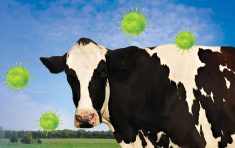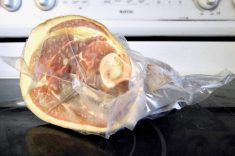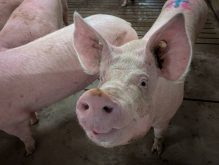Democrats and Republicans in the U.S. don’t agree on much, but in trade protectionism, there’s common cause.
That’s why increasing bipartisan talk on Capitol Hill to resurrect COOL (country-of-origin labelling) for U.S.-sold beef, has Canada’s meat sector on guard.
COOL is back in the headlines, seven years after a lengthy World Trade Organization (WTO) dispute saw the U.S. repeal mandatory COOL Dec. 18, 2015.
Why it matters: Canada’s cattle and hog industries say COOL cost billions in lost revenues between 2008 and 2015 and took years to get removed. The sector doesn’t want to have to fight that battle again.
COOL required American processors to include animal birth and slaughter location on labels and to therefore segregate non-American-born cattle and pigs. Canada and Mexico successfully argued that discriminated against their animals and added costs, contrary to trade rules.
The WTO authorized Canada to impose about $1.1 billion in retaliatory tariffs if the U.S. failed to terminate COOL.
The years-long fight eventually cost the Canadian Cattlemen’s Association and Canadian Pork Council close to $4 million and $1 million, respectively, in legal fees.
“To hear those discussions on COOL comeback is worrying,” Manitoba Pork Council general manager Cam Dahl said May 3. “I know right now the only term being talked about is beef, but I am hearing ‘beef’ and seeing ‘meat.’ I think, as livestock producers in Canada, we’re in the same boat on this and we need to take it very seriously. I am concerned. It’s something we need to be paying attention to and it’s something our government needs to be paying attention to.”
In addition to an attempted COOL revival, the Americans are fighting to get more access to Canada’s dairy market.
Back on the table
Tom Vilsack, U.S. President Joe Biden’s pick for agriculture secretary, brought COOL back into the limelight during his Senate confirmation hearing, Feb. 2, 2021.
“I’m happy to work with you and your staff on anything that would allow us to advance country-of-origin labelling,” he said during a back and forth with a Republican senator. “If there is a way to get WTO compliant, I would be more than happy to work with you, and look forward to that.
“I’m absolutely willing to listen to anybody and everybody who has an idea on how we can circumvent or get to a point where the WTO doesn’t slap it down, that creates retaliatory impacts on American agriculture.”
Last fall, the U.S. Senate introduced a bipartisan bill, S. 2716, to restore the word “beef” into labelling law under the U.S. Agricultural Marketing Act.
In March of this year, a similar bill, H.R. 7291, was introduced in the House of Representatives.
If enacted, it would give Vilsack and U.S. Trade Representative Katherine Tai up to 180 days to “determine a means of reinstating” mandatory COOL for beef in a way that’s “in compliance with all applicable rules of the World Trade Organization (WTO).”
Speaking at the North American Agricultural Journalists’ (NAAJ) meeting April 25, Vilsack acknowledged the WTO found in Canada’s favour on COOL. What’s being considered now is voluntary labelling for products of the United States, he said, adding that a survey will first see if consumers understand what “Product of U.S.A.” means.
Do consumers think it means everything connected to a pork chop or hamburger was done in the U.S.?
“We’re interested in knowing if individual consumers attach a value to that proposition,” Vilsack said. “In other words, are they interested in considering the possibility of paying a penny or a few more if they know the product is a product of the U.S.?”
Vilsack hopes survey results will be in by year’s end.
Consumers want to know where their food is from, Republican Glenn “GT” Thompson, the U.S. representative for Pennsylvania’s 15th congressional district and ranking member of the House agriculture committee, told the NAAJ meeting.
“And I don’t think there is anything in international, national or local law that prevents a producer from promoting where their meat or their milk or anything else comes from,” he said.
“Countries… have certain limitation rules that we have to live in, but if you’re a producer you take whatever marketing opportunity,” he said.
U.S. farmers are frustrated their products aren’t labelled, Republican Sen. John Boozman, the ranking member of the Senate agriculture committee, told the NAAJ meeting. He added, however, that labelling must be WTO compliant.
“I understand their (farmers’) concerns,” he said. “They want to make sure that their product is labelled accurately.”
From the other side of the political aisle, New Jersey Sen. Cory Booker, a Democrat and sponsor of S. 2716, said Americans ought to know where their food originates. His comments came during an April 26 Senate agriculture committee hearing on a bill to increase competition and price discovery among cattle packing plants.
“It is utter deception for American consumers that we don’t label products of the U.S.A. as Products of the U.S.A.,” he said. “You let Mexican cattle come into our country, be processed by these big multinational corporations as we label this as ‘Products of the United States of America.’ That is outrageous. That is lying to consumers. That is deceptive practices and it should end because it’s ultimately hurting American ranchers.”
Canadian response
Voluntary labelling is permitted under WTO rules, Dahl said.
“If it was something that was practical and demanded by consumers, we would be seeing more of it on store shelves, but we’re not because it is very costly,” he said. “That was our argument to the WTO — it was imposing significant restrictions and discriminating against Canada and Mexico. I think those costs are very real and that’s why you’re not seeing voluntary labelling adopted more than it is.”
Al Mussell, an agricultural economist with Agri-Food Economic Systems, is skeptical about voluntary labelling.
“It’s hard to see how this could achieve the objectives of the proponents of the bill and not be distorting,” he said. “The whole deal is to find a way to treat or position product of the U.S. better than product of somewhere else, including Canada. Fundamentally that violates GATT Article III, which deals with ‘like’ treatment. I am not sure how they engineer that (voluntary label).”
GATT (General Agreement on Tariffs and Trade) underpins many of the WTO’s rulings on international trade.
While COOL talk grows louder, Manitoba Beef Producers president Tyler Fulton said he’s relieved, since Canada has the right to retaliate with WTO-approved tariffs if a non-WTO-compliant COOL returns.
“It gives me comfort that there is no timeline for which our right to retaliate expires,” Fulton, also a farmer near Birtle, Man., said. “I think we are all better off if there is not conflict and we work together to ensure open and free trade of animals.”
The North American cattle, beef, hog and pork markets are integrated, he added.
“It is that open and free trade that allows for more efficiency allocation of available supplies, which at the end of the day makes our product more affordable to consumers,” he said.
Like Fulton, the Canadian Cattlemen’s Association (CCA) believes the WTO ruling, remains a deterrent.
“We continue to closely monitor any developments related to COOL,” said Fawn Jackson, director of CCA’s policy and international affairs. “We do remain concerned about any measures that may cause disruptions in the integrated North American meat industry…
“I think there is a large understanding of the value of trade between our two nations and the importance of that being able to continue.”
Warning signs
Some experts saw the possibility of COOL 2.0 before Vilsack’s return as agriculture secretary, a position he held during much of the Obama administration.
In a prescient paper published in December 2020, agricultural economists Ryan Cardwell of the University of Manitoba and William A. Kerr of the University of Saskatchewan wrote that candidate Biden’s “made in all of America” policy pledges could disrupt agri-food trade.
“There remains broad bipartisan support for resurrecting mandatory country-of-origin labelling (MCOOL) requirements for meat imports into the United States, which is the type of policy that a new administration could position under the ‘buy American’ banner,” the paper read. “Reviving MCOOL as a ‘buy American’ policy would be even more nakedly protectionist than the last time it was introduced, making such a move unlikely to hold up in a WTO dispute.”
But the paper also notes that it took more than seven years to get COOL repealed the first time, during which time Canadian exporters were injured.
“Further, the paralyzed state of dispute settlement at the WTO makes it unclear that future disputes will even be pursued,” the report said.
Mussell agrees.
“Without a functioning (WTO) appeals panel, the U.S. could potentially enact something, but it’s hard for me to see, particularly given the precedent and just the reality of GATT Article III, how it survives,” he said. “But then they (U.S.) could just turn around and appeal it to a body that doesn’t exist and just more or less carry on with it.”
Given all the other issues facing American legislators — high food prices, inflation and international food security — Mussell wonders if COOL might lose momentum.
Then again, he said, there’s not much political downside in the U.S. for supporting it.
“This is one of those weird issues where progressive Democrats and the Trump Republican types can agree,” he said. “Protectionism plays well with both audiences, and the dangerous place right now to be is in the middle.”
— With files from Alex Binkley, Dave Bedard and D.C. Fraser
















